- Home
- Kami Garcia
Beautiful Creatures Page 6
Beautiful Creatures Read online
Page 6
It wasn’t just Lena. She wasn’t the first. I’d watched them do it, my whole life. They’d done it to Allison Birch when her eczema got so bad nobody would sit near her at the lunch table, and poor Scooter Richman because he played the worst trombone in the history of the Jackson Symphony Orchestra.
While I’d never picked up a marker and written LOSER across a locker myself, I had stood by and watched, plenty of times. Either way, it had always bothered me. Just never enough to walk out of the room.
But somebody had to do something. A whole school couldn’t just take down one person like that. A whole town couldn’t just take down one family. Except, of course, they could, because they had been doing it forever. Maybe that’s why Macon Ravenwood hadn’t left his house since before I was born.
I knew what I was doing.
You don’t. You think you do, but you don’t.
She was there in my head again, as if she’d always been there.
I knew what I’d be facing the next day, but none of that mattered to me. All I cared about was finding her. And I couldn’t have told you just then if it was for her, or for me. Either way, I didn’t have a choice.
I stopped at the bio lab, out of breath. Link took one look at me and tossed me his keys, shaking his head without even asking. I caught them and kept running. I was pretty sure I knew where to find her. If I was right, she had gone where anyone would go. It’s where I would have gone.
She had gone home. Even if home was Ravenwood, and she had gone home to Gatlin’s own Boo Radley.
Ravenwood Manor loomed in front of me. It rose up on the hill like a dare. I’m not saying I was scared, because that’s not exactly the word for it. I was scared when the police came to the door the night my mom died. I was scared when my dad disappeared into his study and I realized he would never really come back out. I was scared when I was a kid and Amma went dark, when I figured out the little dolls she made weren’t toys.
I wasn’t scared of Ravenwood, even if it turned out to be as creepy as it looked. The unexplained was sort of a given in the South; every town has a haunted house, and if you asked most folks, at least a third of them would swear they’d seen a ghost or two in their lifetime. Besides, I lived with Amma, whose beliefs included painting our shutters haint blue to keep the spirits out, and whose charms were made from pouches of horsehair and dirt. So I was used to unusual. But Old Man Ravenwood, that was something else.
I walked up to the gate and hesitantly laid my hand on the mangled iron. The gate creaked open. And then, nothing happened. No lightning, no combustion, no storms. I don’t know what I was expecting, but if I had learned anything about Lena by now, it was to expect the unexpected, and to proceed with caution.
If anyone had told me a month ago that I would ever walk past those gates, up that hill, and set foot anywhere on the grounds of Ravenwood, I would’ve said they were crazy. In a town like Gatlin, where you can see everything coming, I wouldn’t have seen this. Last time, I had only made it as far as the gates. The closer I got, the easier it was to see that everything was falling apart. The great house, Ravenwood Manor, looked just like the stereotypical Southern plantation that people from up North would expect to see after all those years of watching movies like Gone with the Wind.
Ravenwood Manor was still that impressive, at least in scale. Flanked by palmetto and cypress trees, it looked like it could have been the kind of place where people sat on the porch drinking mint juleps and playing cards all day, if it wasn’t falling apart. If it wasn’t Ravenwood.
It was a Greek Revival, which was unusual for Gatlin. Our town was full of Federal-style plantation houses, which made Ravenwood stand out even more like the sore thumb it was. Huge white Doric pillars, paint peeling from years of neglect, supported a roof that sloped too sharply to one side, giving the impression that the house was leaning over like an arthritic old woman. The covered porch was splintered and falling away from the house, threatening to collapse if you dared set so much as a foot on it. Thick ivy grew so densely over the exterior walls that in some places it was impossible to see the windows underneath. As if the grounds had swallowed up the house itself, trying to take it back down into the very dirt it had been built upon.
There was an overlapping lintel, the part of the beam that lies over the door of some really old buildings. I could see some sort of carving in the lintel. Symbols. They looked like circles and crescents, maybe the phases of the moon. I took a tentative step onto a groaning stair so I could get a closer look. I knew something about lintels. My mom had been a Civil War historian, and she had pointed them out to me on our countless pilgrimages to every historical site within a day’s drive of Gatlin. She said they were really common in old houses and castles, in places like England and Scotland. Which is where some of the people from around here were from, well, before they were from around here.
I had never seen one with symbols carved into it before, only words. These were more like hieroglyphs, surrounding what looked like a single word, in a language I didn’t recognize. It had probably meant something to the generations of Ravenwoods who lived here before this place was falling apart.
I took a breath and vaulted up the rest of the porch steps, two at a time. Figured I increased my odds of not falling through them by fifty percent if I only landed on half of them. I reached for the brass ring suspended from a lion’s mouth that served as a knocker, and I knocked. I knocked again, and again. She wasn’t home. I had been wrong, after all.
But then I heard it, the familiar melody. Sixteen Moons. She was here somewhere.
I pushed down on the calcified iron of the door handle. It groaned, and I heard a bolt responding on the other side of the door. I prepared myself for the sight of Macon Ravenwood, who nobody had seen in town, not in my lifetime anyway. But the door didn’t open.
I looked up at the lintel, and something told me to try. I mean, what was the worst that could happen—the door wouldn’t open? Instinctively, I reached up and touched the central carving above my head. The crescent moon. When I pressed on it, I could feel the wood giving way under my finger. It was some kind of trigger.
The door swung open without so much as a sound. I stepped past the threshold. There was no going back now.
Light flooded through the windows, which seemed impossible considering the windows on the outside of the house were completely covered with vines and debris. Yet, inside it was light, bright, and brand new. There was no antique period furniture or oil paintings of the Ravenwoods who came before Old Man Ravenwood, no antebellum heirlooms. This place looked more like a page out of a furniture catalog. Overstuffed couches and chairs and glass-topped tables, stacked with coffee table books. It was all so suburban, so new. I almost expected to see the delivery truck still parked outside.
“Lena?”
The circular staircase looked like it belonged in a loft; it seemed to keep winding upward, far above the second-floor landing. I couldn’t see the top.
“Mr. Ravenwood?” I could hear my own voice echo against the high ceiling. There was nobody here. At least, nobody interested in talking to me. I heard a noise behind me, and jumped, nearly tripping over some kind of suede chair.
It was a jet-black dog, or maybe a wolf. Some kind of scary house pet, because it wore a heavy leather collar with a dangling silver moon that jingled when it moved. It was staring right at me like it was plotting its next move. There was something odd about its eyes. They were too round, too human-looking.
The wolf-dog growled at me and bared its teeth. The growl became loud and shrill, more like a scream. I did what anyone would do.
I ran.
I stumbled down the stairs before my eyes had even adjusted to the light. I kept running, down the gravel path, away from Ravenwood Manor, away from the frightening house pet and the strange symbols and the creepy door, and back into the safe, dim light of the real afternoon. The path wound on and on, snaking through unkempt fields and groves of uncultivated trees, wild with brambl
es and bushes. I didn’t care where it led, as long as it was away.
I stopped and bent over, hands on knees, my chest exploding. My legs were rubber. When I looked up, I saw a crumbling rock wall in front of me. I could barely make out the tops of the trees beyond the wall.
I smelled something familiar. Lemon trees. She was here.
I told you not to come.
I know.
We were having a conversation, except we weren’t. But just like in class, I could hear her in my head, as if she was standing next to me whispering in my ear.
I felt myself moving toward her. There was a walled garden, maybe even a secret garden, like something out of a book my mother would have read growing up in Savannah. This place must have been really old. The stone wall was worn away in places and completely broken in others. When I pushed through the curtain of vines that hid the old, rotting wooden archway, I could just barely hear the sound of someone crying. I looked through the trees and the bushes, but I still couldn’t see her.
“Lena?” Nobody answered. My voice sounded strange, as if it wasn’t mine, echoing off the stone walls that surrounded the little grove. I grabbed the bush closest to me and ripped off a branch. Rosemary. Of course. And in the tree above my head, there it was: a strangely perfect, smooth, yellow lemon.
“It’s Ethan.” As the muffled sounds of sobbing grew, I knew I was coming closer.
“Go away, I told you.” She sounded like she had a cold; she had probably been crying since she left school.
“I know. I heard you.” It was true, and I couldn’t explain it. I stepped carefully around the wild rosemary, stumbling through the overgrown roots.
“Really?” She sounded interested, momentarily distracted.
“Really.” It was like the dreams. I could hear her voice, except she was here, crying in an overgrown garden in the middle of nowhere, instead of falling through my arms.
I parted a large tangle of branches. There she was, curled up in the tall grasses, staring up at the blue sky. She had one arm tossed over her head, and another clutching at the grass, as if she thought she would fly away if she let go. Her gray dress lay in a puddle around her. Her face was streaked with tears.
“Then why didn’t you?”
“What?”
“Go away?”
“I wanted to make sure you were okay.” I sat down next to her. The ground was surprisingly hard. I ran my hand underneath me and discovered I was sitting on a smooth slab of flat stone, hidden by the muddy overgrowth.
Just as I lay back, she sat up. I sat up, and she flopped back down. Awkward. That was my every move, when it came to her.
Now we were both lying down, staring up at the blue sky. It was turning gray, the color of the Gatlin sky during hurricane season.
“They all hate me.”
“Not all of them. Not me. Not Link, my best friend.”
Silence.
“You don’t even know me. Give it time; you’ll probably hate me, too.”
“I almost ran you down, remember? I have to be nice to you, so you don’t have me arrested.”
It was a lame joke. But there it was, the smallest smile I have possibly ever seen in my life. “It’s right up at the top of my list. I’ll report you to that fat guy who sits in front of the supermarket all day.” She looked back up at the sky. I watched her.
“Give them a chance. They’re not all bad. I mean, they are, right now. They’re just jealous. You know that, right?”
“Yeah, sure.”
“They are.” I looked at her, through the tall grass. “I am.”
She shook her head. “Then you’re crazy. There’s nothing to be jealous of, unless you’re really into eating lunch alone.”
“You’ve lived all over.”
She looked blank. “So? You’ve probably gotten to go to the same school and live in the same house your whole life.”
“I have, that’s the problem.”
“Trust me, it’s not a problem. I know about problems.”
“You’ve gone places, seen things. I’d kill to do that.”
“Yeah, all by myself. You have a best friend. I have a dog.”
“But you’re not scared of anyone. You act the way you want and say whatever you want. Everyone else around here is scared to be themselves.”
Lena picked at the black polish on her index finger. “Sometimes I wish I could act like everyone else, but I can’t change who I am. I’ve tried. But I never wear the right clothes or say the right thing, and something always goes wrong. I just wish I could be myself and still have friends who noticed whether I’m in school or not.”
“Believe me, they notice. At least, they did today.” She almost laughed—almost. “I mean, in a good way.” I looked away.
I notice.
What?
Whether you’re in school or not.
“Then I guess you are crazy.” But when she said the words, it sounded like she was smiling.
Looking at her, it didn’t seem to matter anymore if I had a lunch table to sit at or not. I couldn’t explain it, but she was, this was, bigger than that. I couldn’t sit by and watch them try to take her down. Not her.
“You know, it’s always like this.” She was talking to the sky. A cloud floated into the darkening gray-blue.
“Cloudy?”
“At school, for me.” She held up her hand and waved it. The cloud seemed to swirl in the direction her hand was moving. She wiped her eyes with her sleeve.
“It’s not like I really care if they like me. I just don’t want them to automatically hate me.” Now the cloud was a circle.
“Those idiots? In a few months, Emily will get a new car and Savannah will get a new crown and Eden will dye her hair a new color and Charlotte will get, I don’t know, a baby or a tattoo or something, and this will all be ancient history.” I was lying, and she knew it. Lena waved her hand again. Now the cloud looked more like a slightly dented circle, and then maybe a moon.
“I know they’re idiots. Of course they’re idiots. All that dyed blond hair and those stupid little matching metallic bags.”
“Exactly. They’re stupid. Who cares?”
“I care. They bother me. And that’s why I’m stupid. That makes me exponentially more stupid than stupid. I’m stupid to the power of stupid.” She waved her hand. The moon blew away.
“That’s the stupidest thing I’ve ever heard.” I looked at her out of the corner of my eye. She tried not to smile. We both just lay there for a minute.
“You know what’s stupid? I have books under my bed.” I just said it, like it was something I said all the time.
“What?”
“Novels. Tolstoy. Salinger. Vonnegut. And I read them. You know, because I want to.”
She rolled over, propping her head on her elbow. “Yeah? What do your jock buddies think of that?”
“Let’s just say I keep it to myself and stick to my jump shot.”
“Yeah, well. At school, I noticed you stick to comics.” She tried to sound casual. “Silver Surfer. I saw you reading it. Right before everything happened.”
You noticed?
I might have noticed.
I didn’t know if we were speaking, or if I was just imagining the whole thing, except I wasn’t that crazy—yet.
She changed the subject, or more accurately, she changed it back. “I read, too. Poetry mostly.”
I could imagine her stretched out on her bed reading a poem, although I had trouble imagining that bed in Ravenwood Manor. “Yeah? I’ve read that guy, Bukowski.” Which was true, if two poems counted.
“I have all his books.”
I knew she didn’t want to talk about what had happened, but I couldn’t take it anymore. I had to know. “Are you going to tell me?”
“Tell you what?”
“What happened back there?”
There was a long silence. She sat up and pulled at the grass around her. She flopped around on her stomach and looked me in the eye. She was
only a few inches away from my face. I lay there, frozen, trying to focus on what she was saying. “I really don’t know. Things like that just happen to me, sometimes. I can’t control it.”
“Like the dreams.” I watched her face, looking for even a flicker of recognition.
“Like the dreams.” She said it without thinking, then flinched and looked at me, stricken. I had been right all along.
“You remember the dreams.”
She hid her face in her hands.
I sat up. “I knew it was you, and you knew it was me. You knew what I was talking about the whole time.” I pulled her hands away from her face, and the current buzzed up my arm.
You’re the girl.
“Why didn’t you say something last night?”
I didn’t want you to know.
She wouldn’t look at me.
“Why?” The word sounded loud, in the quiet of the garden. And when she looked at me, her face was pale, and she looked different. Frightened. Her eyes were like the sea before a storm on the Carolina coast.
“I didn’t expect you to be here, Ethan. I thought they were just dreams. I didn’t know you were a real person.”
“But once you knew it was me, why didn’t you say anything?”
“My life is complicated. And I didn’t want you—I don’t want anyone to get mixed up in it.” I had no idea what she was talking about. I was still touching her hand; I was so aware of it. I could feel the rough stone beneath us, and I grabbed for the edge of it, supporting myself. Only my hand closed around something small and round, stuck to the edge of the stone. A beetle, or maybe a rock. It came off from the stone into my hand.
Then the shock hit. I felt Lena’s hand tighten around mine.
What’s happening, Ethan?
I don’t know.
Everything around me changed, and it was like I was somewhere else. I was in the garden, but not in the garden. And the smell of lemons changed, into the smell of smoke—

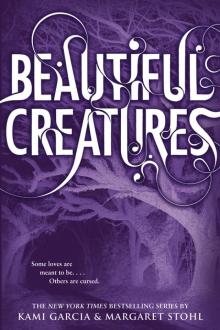 Beautiful Creatures
Beautiful Creatures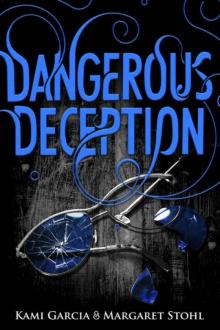 Dangerous Deception
Dangerous Deception Unmarked
Unmarked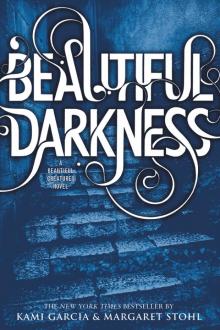 Beautiful Darkness
Beautiful Darkness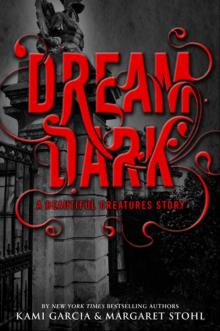 Dream Dark
Dream Dark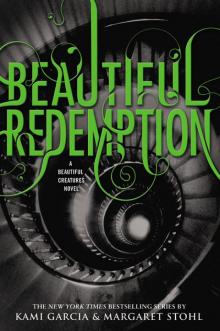 Beautiful Redemption
Beautiful Redemption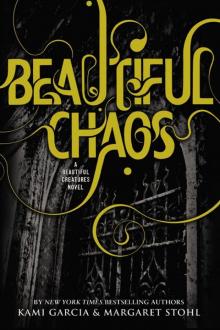 Beautiful Chaos
Beautiful Chaos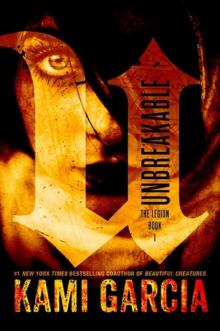 Unbreakable
Unbreakable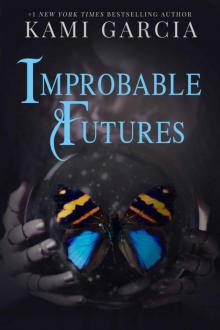 Improbable Futures
Improbable Futures Broken Beautiful Hearts
Broken Beautiful Hearts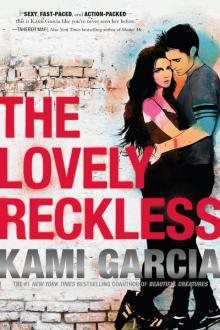 The Lovely Reckless
The Lovely Reckless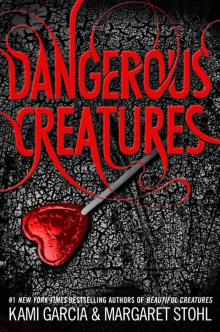 Dangerous Creatures
Dangerous Creatures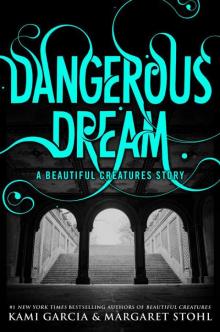 Dangerous Dream
Dangerous Dream The X-Files Origins--Agent of Chaos
The X-Files Origins--Agent of Chaos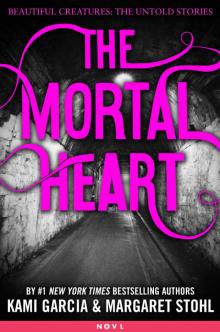 The Mortal Heart
The Mortal Heart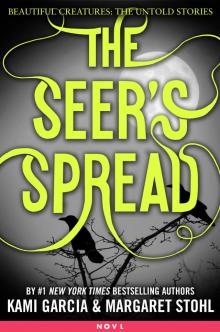 The Seer's Spread
The Seer's Spread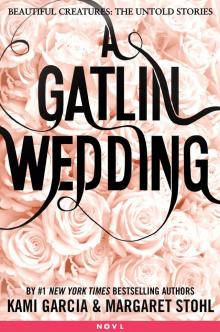 A Gatlin Wedding
A Gatlin Wedding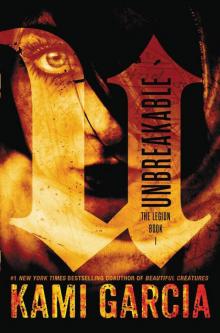 Unbreakable l-1
Unbreakable l-1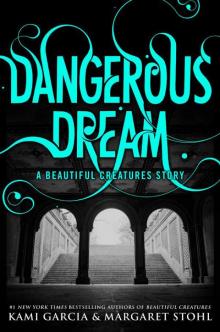 Dangerous Dream: A Beautiful Creatures Story
Dangerous Dream: A Beautiful Creatures Story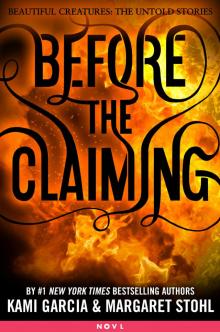 Before the Claiming
Before the Claiming